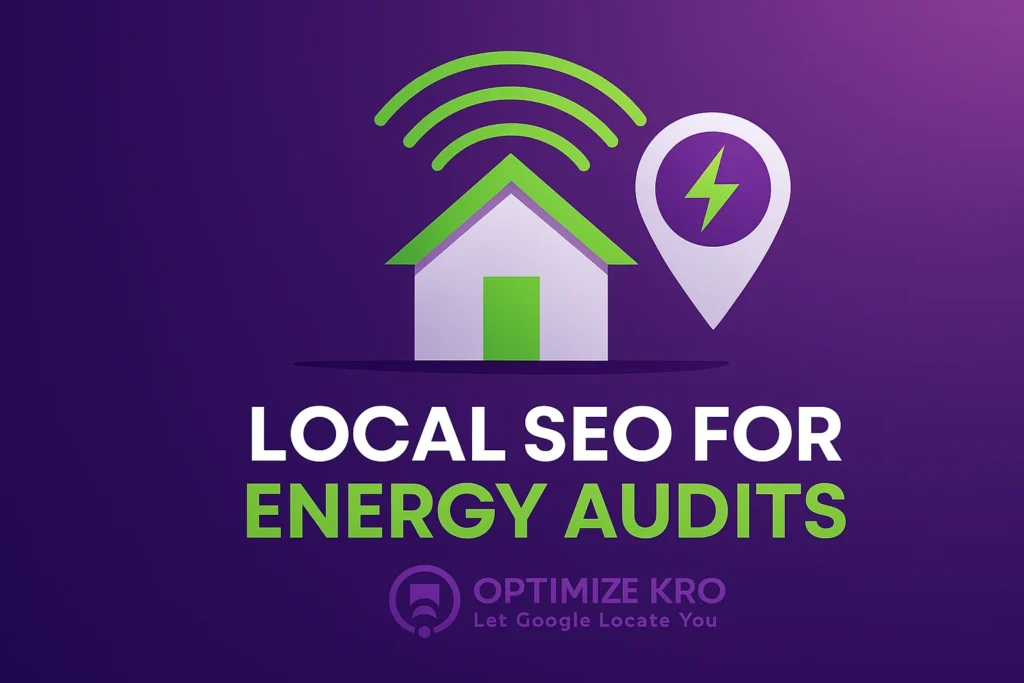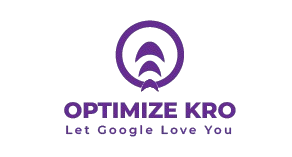In today’s world, energy efficiency is no longer a luxury—it’s a necessity. More homeowners and businesses are turning to energy audit professionals to help lower energy bills, reduce carbon footprints, and improve property performance. But here’s the challenge: with so many providers offering similar services, how do you ensure that your energy audit business stands out locally?

The answer lies in local SEO (Search Engine Optimization). By optimizing your business for local searches, you can attract highly qualified leads right in your area—people actively searching for “energy audit near me” or “home energy efficiency testing in [city].”
This guide breaks down everything you need to know about local SEO for energy audits and how to dominate local search rankings.
Why Local SEO Matters for Energy Audits
Unlike general SEO, local SEO focuses on connecting your business with nearby customers. When someone searches for “energy audit services near me,” search engines prioritize businesses within their geographic area.
For energy auditors, this means:
- More targeted leads – Only people in your service area find you.
- Higher conversion rates – Local customers searching for energy audits usually need the service soon.
- Competitive advantage – Many energy audit companies don’t fully optimize for local SEO, giving you an edge.
Read More
Local SEO for Inspection & Real Estate Support
Local SEO for Audio / Visual / Home Theater Installation
Local SEO for Smart Home Installation Services
Local SEO for Appliance Repair & Installation
Key Local SEO Strategies for Energy Auditors
1. Optimize Your Google Business Profile (GBP)
Your Google Business Profile (formerly Google My Business) is your most powerful local SEO tool.
- Claim and verify your listing.
- Use your main keyword (e.g., “Energy Audit Services in [City]”) in your business name or description.
- Add accurate business details (address, phone number, service areas, website).
- Upload high-quality photos (team, equipment, before/after audit results).
- Collect and respond to customer reviews regularly.
📌 Pro Tip: Use the “Services” and “Products” sections to list specific offerings like “Residential Energy Audits,” “Commercial Energy Efficiency Testing,” or “Thermal Imaging Inspections.”
2. Local Keyword Research
To rank locally, you need location-based keywords.
Examples:
- “Energy audit services in Los Angeles”
- “Home energy efficiency testing near Dallas”
- “Commercial energy audits [City]”
- “HVAC energy efficiency inspections in [Region]”
Use tools like Google Keyword Planner or Ubersuggest, but also look at Google’s “People Also Ask” and “Related Searches” for inspiration.
3. Create Localized Content
Publishing content tailored to your city or service area helps boost visibility.
Ideas for blog posts:
- “Top 5 Benefits of an Energy Audit for Homeowners in [City]”
- “How Businesses in [City] Can Save on Utility Bills with an Energy Audit”
- “The Cost of an Energy Audit in [City]: What to Expect”
This type of content not only ranks but also establishes you as the local authority in energy efficiency.
4. Optimize On-Page SEO
Your website should include local signals:
- Add your city/region in meta titles, meta descriptions, and H1 tags.
- Create a dedicated “Service Areas” page.
- Use schema markup for Local Business to help search engines understand your location.
- Include your NAP (Name, Address, Phone Number) consistently on every page and in the footer.
What Our Clients Say
Trusted by contractors and local businesses for proven Local SEO Services.
John M. – General Contractor
“These guys transformed my Google Maps ranking. More calls, more local leads, and better visibility!”
Sarah L. – Roofing Business
“Within 3 months, my business went from page 3 to the top 3 listings. Highly recommend their Local SEO service!”
David K. – Plumbing Services
“Affordable and effective SEO. My local service calls doubled in less than 90 days.”
5. Build Local Citations & Backlinks
Citations are online mentions of your business (even without a link). Consistency matters—your NAP must match across directories.
List your business on:
- Yelp
- Angi (formerly Angie’s List)
- HomeAdvisor
- Better Business Bureau
- Local chambers of commerce directories
Also, partner with local green energy blogs, real estate agents, or contractors for backlinks.
6. Collect and Showcase Reviews
Customer reviews are one of the strongest local SEO ranking factors.
- Encourage happy clients to leave reviews on Google, Yelp, and industry directories.
- Respond professionally to all reviews, positive or negative.
- Showcase testimonials on your website with location-specific details.
Example:
“John’s Energy Audit in Austin, TX saved me over $500 a year on utility bills!”
7. Leverage Social Media for Local Reach
Use Facebook, LinkedIn, and Instagram to target local homeowners and businesses. Join local community groups, share tips on reducing energy waste, and post before/after case studies.
Final Thoughts
Local SEO for energy audit services is all about visibility, trust, and targeting the right customers in your area. By optimizing your Google Business Profile, website, content, and citations, you can position your business as the go-to expert for energy efficiency.
The cost of an energy audit typically ranges from $150 to $600 for a standard home, depending on the size of the property and the level of detail required.
Basic audits (walk-through inspection) may cost around $150–$250.
Comprehensive audits (including blower door tests, thermal imaging, and detailed reports) usually range from $300–$600 or more.
Larger homes, commercial properties, or specialized audits can cost $1,000+.
You can get an energy audit by following these steps:
Contact Your Utility Company – Many utility providers offer free or discounted energy audits for their customers.
Hire a Certified Energy Auditor – Look for professionals certified by organizations like BPI (Building Performance Institute) or RESNET.
Check Local or State Programs – Some government programs offer rebates or incentives for audits and energy-efficient upgrades.
Book an Appointment – The auditor will visit your home or business to inspect insulation, HVAC systems, appliances, windows, and more.
Get the Report – After the audit, you’ll receive a detailed report with recommendations to improve efficiency and save money.
The two main types of energy audits are:
Preliminary (or Walk-Through) Audit
A basic inspection of the building.
Identifies obvious areas of energy waste.
Low-cost and quick but less detailed.
Detailed (or Comprehensive) Audit
Involves in-depth analysis with tools like blower door tests, infrared cameras, and data logging.
Provides precise measurements of energy use.
Includes cost–benefit analysis and detailed recommendations for improvements.
Yes. In the U.S., you can get a tax credit of 30% of the cost of a home energy audit, up to $150, if it’s done by a qualified auditor.

Gulfam Qamar is a seasoned Local SEO expert with a proven track record of helping businesses boost their online visibility and dominate local search results. With deep expertise in Google Business Profiles, on-page optimization, and local citation strategies, Gulfam helps brands connect with nearby customers and grow sustainably. When he’s not optimizing websites, he’s sharing actionable SEO tips and insights to empower small businesses in the digital space.

